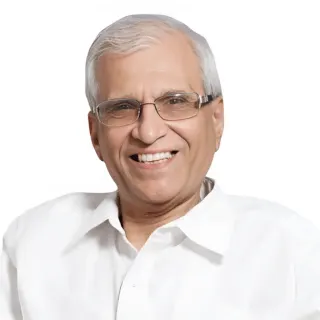Best Cosmetic & Plastic Surgeons in Indraprastha Apollo Hospital Delhi
 29 January,2026
Read More
29 January,2026
Read More
Enquire now in case of any assistance needed

Back problems have long been known to humans for centuries. They can seriously impact your life. Back pain, stiffness, and restricted movement can make simple tasks difficult. While many spinal issues improve with non-surgical treatments like rest, therapy, and medications, some conditions may require back surgery for long-term relief.
In this guide, we'll cover:
Fill up the form and get assured assitance within 24 hrs!
Back surgery or spine surgery is a procedure designed to address problems in the spine. The spine, made up of bones (vertebrae), discs, nerves, and muscles, is a critical part of your body. It supports your upper body and enables movement. When issues such as herniated discs, spinal stenosis, tumors, infection, or degenerative diseases occur, back surgery may help. Its primary goal is to relieve pain, restore mobility, and prevent further damage.
Spine surgeries are complex and often cause patients to worry. They used to have a 20% to 40% failure rate, and surgeons even have a medical term for it (failed back surgery syndrome). However, with advancements in medical technologies, minimally invasive spine surgeries today are done more precisely and have a 70% to 90% success rate.
Back surgery isn't always the first option for treatment. Doctors often recommend non-surgical methods like physiotherapy, painkillers, or lifestyle changes before considering surgery. However, in certain cases, back surgery becomes necessary:
Recognizing when back surgery is necessary can be difficult. However, below are a few signs that can indicate the need for surgery.
Always consult a spine specialist to evaluate your symptoms and recommend the best course of action.

There are several types of spine surgeries, depending on the condition being treated. Each procedure has specific purposes and methods:
Spine surgery has many potential benefits, especially for people whose pain or conditions haven't improved with other treatments. Some of the benefits of back surgery are:
While back surgery can be effective, it comes with risks and challenges:
If surgery is recommended, proper preparation can improve outcomes and reduce stress.
The recovery process depends on the type of surgery and your overall health.
Back surgery can provide relief for people with persistent pain or severe spinal issues. The decision to undergo spine surgery requires careful consideration and consultation with a specialist. While there are risks, the benefits of improved mobility and reduced pain can significantly enhance your quality of life.
If you're considering back surgery, ensure you understand the options, recovery process, and potential outcomes. Always seek advice from experienced medical professionals to make the best decision for your health.
Fill up the form and get assured assitance within 24 hrs!
Doctor of Pharmacy
Dr. Deepanshu Siwach is a skilled clinical pharmacist with a Doctor of Pharmacy degree.?He has 4+?years of experience and has worked with thousands of patients. He has been associated with some of the top hospitals, such as Artemis Gurgaon.
Head of Department (HOD)
Neurosurgeon
Dr. Anil is a highly experienced Neuro and Spine Surgeon. He has 29+ years of experience and has successfully performed over 10,000 neurosurgical procedures. His expertise lies in Percutaneous Discectomy, Nucleoplasty training, and Minimal Access Spine Su...
Senior Consultant
Medical Oncologist
Nanavati Super Specialty Hospital, Mumbai
WhatsApp UsSenior Director
Gynecologist and Obstetrician, IVF Specialist
Max Super Speciality Hospital, Shalimar Bagh, New Delhi
WhatsApp UsSenior Director
Gynecologist and Obstetrician, IVF Specialist
Max Smart Super Speciality Hospital, Saket, New Delhi
WhatsApp UsSenior Director
Gynecologist and Obstetrician
Max Smart Super Speciality Hospital, Saket, New Delhi
WhatsApp UsSenior Director
Gynecologist and Obstetrician
Max Smart Super Speciality Hospital, Saket, New Delhi
WhatsApp UsSenior Director
Gynecologist and Obstetrician
Max Smart Super Speciality Hospital, Saket, New Delhi
WhatsApp UsThe Art of Effective Communication
 27 January,2026
Read More
27 January,2026
Read More
 20 January,2026
Read More
20 January,2026
Read More
 16 January,2026
Read More
16 January,2026
Read More
 13 January,2026
Read More
13 January,2026
Read More
 09 January,2026
Read More
09 January,2026
Read More
Trusted by Patients
"I am Asim from Bangladesh and was looking for treatment in India for neuro. I visited many websites to get the complete information regarding the treatment but I was not satisfied as I was getting confused. In the meanwhile, one of my friends suggested I seek help from Medi Journey as he experienced his medical journey very smoothly and was satisfied with it. They have filtered the top 10 doctors as per experience, the success rate of surgery & profile, so it helps us to choose the best treatment in India. "
"For my knee surgery, Medi Journey guided me to BLK Hospital where I received exceptional care. The team's support and the expertise at BLK Hospital exceeded my expectations. Thank you Medi Journey for making my medical journey stress-free. "
"I came from Iraq for my granddaughter's eye surgery in India facilitated by Medi Journey, due to critical cases they advised us to get a second opinion from the different hospitals before going to surgery. Finally, we went to Fortis Escort Hospital, which helped us to get more confidence for diagnosis. Fortis Escort Hospital has the best eye surgeon team with the latest instruments. Thanks to all team members for providing a high-quality treatment in India at an affordable cost. "
"I came for my hair transplant in India, before coming I was so confused about choosing the best clinic and surgeon for me. But thanks to God one of my friends had a hair transplant in India through Medi Journey. He recommended me to go with them. I am completely happy with my experience with them. They were always very fast in their responses to me. the success rate of my hair transplant surgery is 100%."
"Artemis Hospital, suggested by Medi Journey, turned out to be a great choice for my treatment. The personalized assistance and medical care were exceptional. I'm grateful to Medi Journey for guiding me to a hospital that perfectly matched my needs. Highly recommended! "
"I came from Afghanistan for my treatment in India at Jaypee Hospital, Noida. I had a fantastic experience with Medi Journey. Kudos to them for their incredible support during my medical journey. They not only took care of all the logistics but also connected me with a fantastic healthcare team. Efficient, caring, and highly recommended for a hassle-free medical tourism experience."
"I am Adam from Kano, Nigeria, one of my friends from Nigeria was facilitated by Medi Journey, and he recommended us to go with them. I sent my all reports to them and within 48 hours they reverted with 4 options from different hospitals. They helped me to get a Visa letter from the hospital, arrange pick-up from the airport, and book a hotel for me. Their team is very honest and throughout our stay in India they are with us they are caring for us like his family members. BLK Hospital is the best hospital in India with a top surgical oncologist surgeon team, a very advanced OT, and a Radiotherapy department. I wish more success to Medi Journey. "
"Great experience at the Max Hospital for my spine surgery and was successfully done. I thank my neurosurgeon and his entire team. I recommended all of my country's people to Medi Journey for treatment in India, they choose the best hospital, the best doctors, and the best cost for patients."
"I came to India from Dhaka, Bangladesh for my father-in-law's cardiac surgery at Fortis Hospital. I was confused about choosing the best surgeon for him before coming, but their team helped me to choose the best hospital and best cardiac surgeon in India with very good cost and 100% success rate of surgery. I am very happy with the services, really they make my journey so comfortable that make me feel at home. Thanks again and I like people to choose "Medi Journey" as your travel guide. "
"I am Mohammad from Bangladesh came to India for my general health checkup. Medi Journey offers me the complete package including Pick-up from the airport, hotel services, and 24-hour assistance. They guide you to choose the best hospital in India, the best cost of treatment with top-most doctors and give you complete information about hotel booking, and pick-up from the airport before coming to India They have the best team to help. Always choose Medi Journey for your treatment in India."





